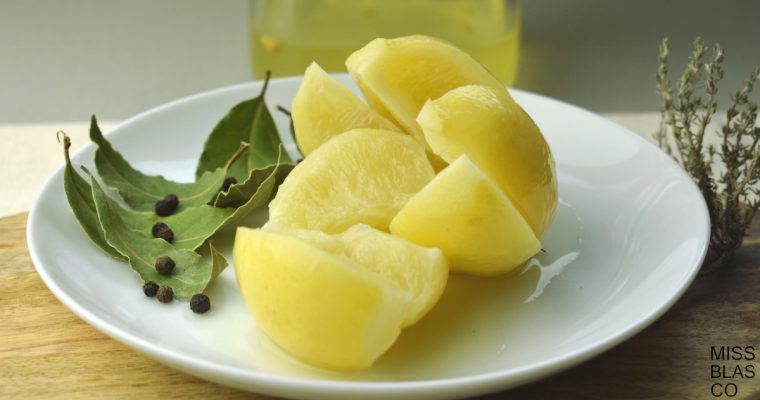
HOW TO FERMENT LEMONS
Learn how to ferment lemons, it is the perfect condiment in many of the preparations you make daily, when you discover its flavor and nutritional benefits, you will not be able to stop preparing them.
When reading this, you may be invaded by some skepticism, you may wonder what the point of fermenting a lemon is, if its aroma, flavor and natural acidity are very pleasant and give a special touch to any preparation.
The answer is simple, by fermenting lemons you not only get a totally different flavor and texture, you are creating a probiotic food that enriches your diet and your intestinal microbiota.
Fermented lemons are ideal as a condiment, in fact, they are part of the Moroccan culinary tradition where it is common for them to be prepared in all homes.
Fermented lemons provide nutritional value to your recipes.
While it is true that fresh lemon is very pleasant and refreshing, fermented lemon maintains that lemon flavor, but very attenuated, its flesh becomes tender and soft, giving the impression of having been candied.
As for its flavor, it changes completely, it loses that pungent acidity of natural lemon, but retains all its flavor, and adds a delicious touch to dressings, hummus, sauces, etc.
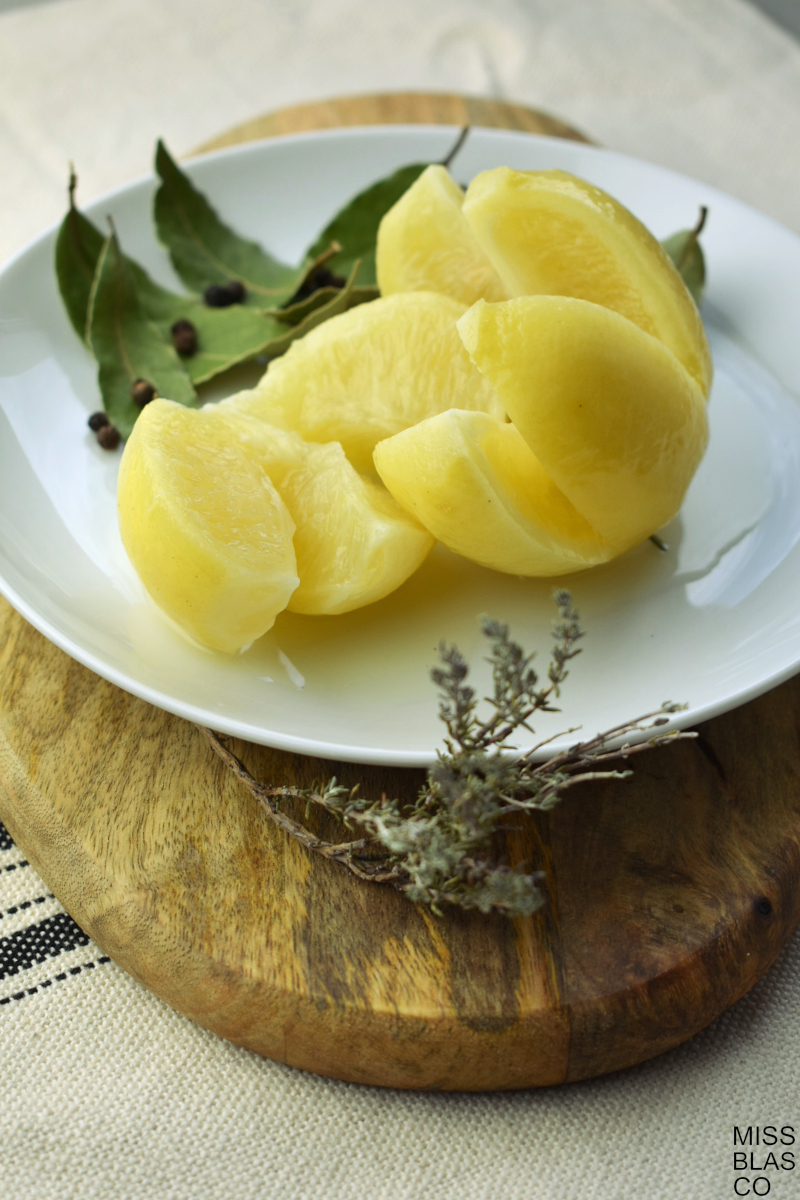
You must keep in mind that to take advantage of all the benefits of a fermented food like this, it must be consumed raw, the temperature destroys the live microorganisms it provides, so adding these fermented lemons to a stew does not make much sense.
The interesting thing is to use fermented lemons to make sauces, dressings and dips, always raw and cold, thus providing the recipe with endless beneficial bacteria and fungi.
These colonies of microorganisms are what will improve the intestinal microbiota of those who consume them.
But in addition to providing nutritional value to your recipes, and consequently, to your diet, fermented lemons provide flavor and texture.
As I said at the beginning, the flavor is very different from that of fresh lemons and their texture too.
On the one hand, with fermentation the flavor softens, and on the other, the texture too, after 3 or 4 weeks of fermenting, the flesh of the lemons seems as if it had been candied, the result is surprising.
Three ingredients: fresh lemons, sea salt and water.
It is certainly worth trying this fermented product considering how easy it is to prepare, the most complicated thing is to be patient, because the rest is very simple.
You need fresh lemons, sea salt and filtered water (that does not contain chlorine, remember that chlorine is bactericidal, so we are not interested).
You can add some black peppercorns, some leaves bay leaf, fresh thyme, rosemary, whatever you like.
The first time you ferment a specific product it is best not to add anything extra, just salt and water, and the following times you can start experimenting.
Fermenting by starting only with brine is very easy, but you can also add liquid from other fermentations.
For example, if you have already fermented lemons, and you want to make a new batch, add a little of the fermentation liquid from the previous ones, it will serve as a starter and will start the process more quickly.

What do you think of this idea? Do you dare to try them? Take advantage of their nutritional benefits and the flavor they provide, you’ll love them.
Related posts:
- How to ferment vegetables at home.
- Ferment cucumbers.
- How to ferment cabbage at home (sauerkraut).
- Easy kimchi (recipe).
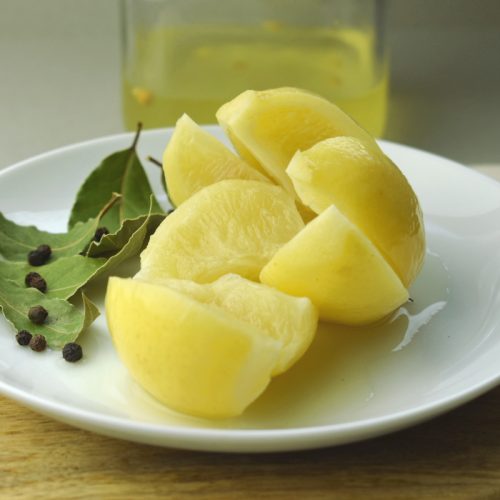
CÓMO FERMENTAR LIMONES
Ingredients
- 4 limones frescos
- 1 litro agua filtrada
- 20 g sal marina
- 1 bote de vidrio con cierre hermético de 2 litros
Instructions
- Lava los limones y córtalos en 4 partes sin llegar a separarlas del todo, déjalas unidas por un extremo.
- Abre los limones y con las manos añade sal en su interior.
- Pon los limones ya salados en el bote, trata de encajarlos lo mejor posible, si consigues que queden ajustados, se mantendrán en el bote sin flotar.
- Prepara la salmuera, por cada litro de agua, añade 20 g de sal marina, intenta disolverla, una buena forma de hacerlo es calentando un poco el agua.
- Añade el agua al bote de los limones, debes conseguir que los limones queden totalmente sumergidos.
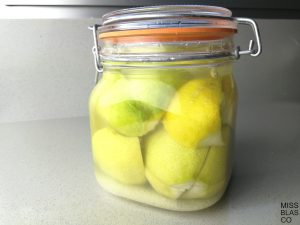
- Cierra el bote, pon una etiqueta con la fecha de envasado y guárdalo en un sitio fresco y oscuro. Tienen que fermentar durante al menos 15 días, hay que ir vigilando que los limones estén siempre sumergidos y es importante abrir el bote cada 1 o 2 días para que salga el gas que genera la fermentación.
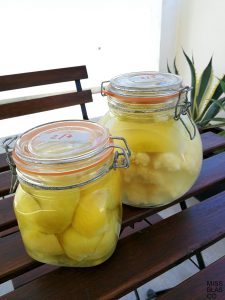
Notes
- El tiempo total de fermentación puede variar, a más temperatura, menos tiempo. Por lo tanto, en verano puede que con 15 días sea suficiente, en invierno, pueden estar más tiempo, 1 mes o incluso más.
BÁSICOS, DRESSING, FERMENTADOS, LIMON, LOW CARB, MICROBIOTA, RECETA SANA
Dany Serrano
Sigo tu página, es estupenda, muchas gracias por toda la información.
missblasco
Hola Dany!, muchísimas gracias por tu comentario, me alegro de que te guste! Saludos. 😉
SILVIA
Me encanta la introducción que das a cada una de tus recetas. Haces que sean… importantes. Muchas gracias.
Por cierto, los limones una vez fermentados,¿los conservamos en el frasco en el líquido? o los pasamos a la nevera…
missblasco
Hola Silvia! Los limones fermentados se conservan en el mismo líquido de la fermentación, pero dentro del frigorífico, así detienes el proceso y pueden durar meses.
Gracias por lo que comentas, me encanta demostrar que hasta el alimento más humilde puede ser importante si le damos el tratamiento adecuado. Saludos!! 😉
Ely
Estupenda receta. Mañana mismo la hago con unos limones de una finca que me han regalado. Ya contaré que tal me ha ido :0)
Gracias una vez más por tanto y bueno!
missblasco
Me alegro de que te guste, es una gozada contar con este condimento en la cocina, te encantará!
Camila
Hola! Gracias por la receta! 🙂
Con esta misma fermentación después se puede llevar el líquido a una segunda fermentación en botellas para hacer una bebida probiótica?
missblasco
Hola Camila, yo lo que suelo hacer es aprovechar parte del líquido de la fermentación para preparar la siguiente, así el proceso se acelera desde el principio. Nunca lo he aprovechado para tomarlo porque considero que es muy salado y me disgusta. Gracias por tu comentario y la valoración! 😉
Sel
Los limones deberán ser lavados antes de la fermentación?
missblasco
Hola, sí, con agua corriente, sin más.